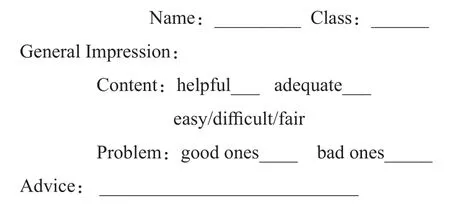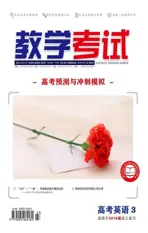以核心素养为导向的英语自主阅读探究
2018-07-19黑龙江张佩云
黑龙江 张佩云 修 卓
(作者单位:张佩云 黑龙江省哈尔滨市教育研究院 修 卓 黑龙江省哈尔滨市第九中学)
一、探索的背景
以往高中的英语教学死抠课本,教师天天讲解语言点和语法要点,采取的是单一讲听问答的模式。这种传统教法费时、费力,枯燥乏味,不能有效地培养学生的语用能力,综合素质不高,不符合现代教学和素质教育的要求。
习近平总书记强调,文化是民族的血脉,是人民的精神家园。中华文化独一无二的理念、智慧、气度、神韵,增添了中国人民和中华民族内心深处的自信和自豪。中华优秀传统文化是我们必须世代传承的文化根脉、文化基因,更是我们坚定道路自信、理论自信、制度自信、文化自信的深厚基础。无论是服务选才,还是引导教学,高考都应该加强中华优秀传统文化教育,引导学生增强文化自觉和文化自信,培育和践行社会主义核心价值观,从而落实“立德树人”的根本任务。2018年的考纲重点强调,英语融入中国优秀传统文化,引导学生积极参与中外文化的对话与交流,通过“讲好中国故事”,增强文化自觉和文化自信。如何培养学生的核心素养和文化自信是英语教师应尽的义务。
发展学生核心素养体系构建对英语自主阅读活动的倡导与实施都具有重要的指导意义。自主阅读是一个个性化的,并出于真实兴趣与切身需要的阅读活动。这种阅读有利于培养学生的阅读素养,同时与英语学科学生素养体系的内涵与外延相符合。
现仅依据课程标准,就如何培养学生自学、自做、自悟和自助的能力及提高阅读能力方面谈谈自己的做法和看法。开始的时候,建议学生选读一些信息较新、语言地道纯正的英语阅读材料,如《妙语短篇》《英语词汇扩充》《书虫系列》《英语循序渐进阶梯阅读》《英语沙龙》等。经过一段时间的训练,我们感到这种阅读方式扩大了阅读面,拓展了视野,加大了学生对英语国家的文化、风俗及习惯的了解。但教师和同学们感觉这种阅读不利于评估反馈,而且由于有的学生元认知能力较差,对理解阅读材料不知从何下手,没有侧重,没有主次,阅读效果不理想;此外,因为每个学生的阅读材料不同,老师无法对所有的材料了如指掌,这就导致了老师无法对学生进行很好的具体的指导。后来,我们意识到让学生自主学习不是“放羊”学习,应该在教师正确的具体指导下培养学生良好的学习习惯,发展他们的认知策略,学生在这种自学、自做、自悟和自助的学习过程中,形成了自己动手、自我监测、自我调控的学习能力。学生在设题和讲解中充分发挥了想象力,也提高了他们的应变能力。另外,让学生设计课、讲课也培养了他们的其他能力,如表演表达能力、行为约束能力等,全方位地提高了学生的素质。学生只有具备多方面的能力,具有较高的综合素质才能适应这个充满机遇和挑战的社会。为此,在课堂教学中,为了极大限度地培养学生的自学、自做、自悟和自助的能力,我们让学生自己动手选择语言纯正的课外阅读材料,从中选出一篇自己最喜欢的文章或片段让学生根据文章特点自己设计题型并且负责讲解。经过一段时间的摸索实践,初步形成了英语自主阅读赏析的教学模式。
二、探索过程
首先,关于安排(Arrangement):要求学生自己选择适合自己水平的、语言纯正的课外阅读材料,从中选出一篇自己最喜欢的文章或片段,这个过程实际上是搜集、选择信息的过程(searching and selecting information)。
其次,组织指导(Organization and Direction):学生选材后,老师要进行筛选把关:衡量文章的难易程度,片段的内容是否完整。确定了阅读内容以后,让学生根据文章特点自己设计题型,在教师指导下,使问题的设置由浅入深,问题的排列有梯度,问题分布全面,问题的着眼点能引导学生揣摩文章主题、作者意图。这种阅读是一种广义上的阅读,它区别于高考中的阅读。高考阅读题型的设置出于一些考务方面的考虑,形式单一,而这种阅读题型多样、新颖,有时还包括一些微型完形题和写作题。仅就猜词一项就可以设置以下题型:(1)猜测中心词;(2)根据所给英语提示猜测生词或词组;(3)通过上下文猜词、换词、填空;(4)适宜地设置启发学生讨论的题型,给学生充分的思维时间和空间,让学生各抒己见,培养其思维的流畅性、变通性与创新性;(5)指导学生在阅读中用自己的语言描述主人公或其他事物,续写故事,将故事改编成对话等等。除以上所提到的,还有很多其他题型。
还有关于操作和发展(Operation and Development )环节,要求选材的同学负责讲解,课前充分预习,在课堂上完成传递信息、分析信息的过程(transferring and analyzing information),同时其他同学接受信息(accepting information)。在这个过程中,对于一些问题要给学生充分的时间与空间,各抒己见。
最后,关于反馈与总结(Feedback and Summary),课后及时做总结,向全体同学指出这堂课的长处和不足,纠正错误,提醒其他同学注意,避免再出现此类问题。课后与讲课的同学做全面细致的交流,听取他们的意见、见解和感想。为了更好地了解掌握学生的阅读情况,教师可以设计反馈表格帮助学生进行自我评价。如:

三、案例纪实
(一)安排同学选择阅读英语材料,然后选出自己欣赏的一篇文章或一个片段。
(二)组织学生选材并自己设题。收集上来两组同学的选材。有些文章生词过多,其中有一篇是侦探片《福尔摩斯》的一个片段,内容是对一个背景的描写,没有具体的故事情景,非常难以理解,而且这位同学的设题也让人无从下手。如:Please tell us what novel the part is chosen from.但是文章的内容根本无法让人猜出出处。还有一篇是韩亮同学从《21世纪英文报》上节选下来的,内容是关于因特网的,专业用语多,篇幅长,所以未被选中。老师经过筛选确定了三篇(通常一堂课能完成三篇文章的内容)。选材和设题如下:
【例1】(From Zhang Shiyao)
If you ever have a chance to go to Finland, you’ll probably be surprised to find how _______ the Finnish people are.
Take the taxi drivers for instance, taxis in Finland are mostly high class Benz with a fare of two US dollars a kilometer.You can go anywhere in one, tell the driver to drop you at any place, say that you have some business to attend to, and then stalk off without paying your fare.And the driver would not show the least sign of anxiety.
The dining rooms in all big hotels not only serve their guests, but also cater to outside diners.Hotel guests have their meals free, so they naturally go to the free dinning rooms to have their meals, and the most they would do to show their good faith is to wave their registration card to the waiter.With such a loose check, you can easily use any old registration card to take a couple of friends to wine and dine free of charge.
The Finnish workers are paid by the hour.If you work in Finland, you’ll be very much on your own as soon as you have agreed with the boss on the hourly rate.From then you just say how many hours you have worked and you’ll be paid accordingly.
With so many loopholes in everyday life, surely Finland must be a heaven to those who love to take“petty advantages”.But the strange thing is, all the taxi-passengers would invariably come back to pay their fare after they have attended to their business; not a single outsider has ever been found in the free hotel dining rooms, workers always give an honest account of the exact hours they have put in.
1.Please choose the best word for the blank.
A.interesting B.foolish C.clever D.stupid
2.Please guess the meaning of the word and the phrase according to the context:
cater_______ petty advantage__________
3.Please show the strange things that the Finnish people do.
4.Why does the author use“strange”to describe the Finnish people?
5.In your opinion, what are the Finnish people like?
【例2】(From Zhou Liwen)
“Are you happy?”I asked my brother, Ian, one day.“Yes.No.It depends on what you mean,”he said.
“Then tell me,”I said, “when was the last time you think you were happy?”
“April 1967,”he said.
It served me right putting a serious question to someone who has joked his way through life.But Ian’s answer reminded me that when we think about happiness, we usually think of something extraordinary, a pinnacle of sheer delight.And those pinnacles seem to get rarer the older we get.
For a child, happiness has a magical quality, I remember making hide-outs in newly cut hay, playing cops and rubbers in the woods, getting a speaking part in the school play.Of course, kids also experience lows, but their delight at such peaks of pleasure as winning a race or getting a new bike is unreserved.
In the teenage years the concept of happiness changes.Suddenly it’s conditional on such things as excitement, love,popularity and I can still feel the agony of not being invited to a party that almost everyone else was going to.
My dictionary defines happy as“lucky”or“fortunate”,but I think a better definition of happiness is“the capacity for enjoyment”.The more we can enjoy what we have, the happier we are.It’s easy to overlook the pleasure we get from loving and being loved, the company of friends, the freedom to live where we please, even good health.
While happiness may be more complex for us, the solution is the same as ever.Happiness isn’t about what happens to us;It’s about how we feel about what happens to us.It’s the knack of finding a positive for every negative, and viewing a setback as a challenge.It’s not wishing for what we don’t have, but enjoying what we do possess.
1.Paraphrase the sentence:“someone who has joked his way through life.”
2.In the passage, what is happiness?
3.Please discuss with your partner how we can get happiness.
【例3】(From Wu Bo)
A Real Man
Somebody said that it couldn’t be done.But he with a chuckle replied that maybe it couldn’t, but he would be one who wouldn’t say so “till he tried”.So he buckled down to with the trace of a grin on his face.If he worried, he hid it.He started to sing as he tackled the thing that couldn’t be done,and he did it.Somebody scoffed:“Oh, you’ll never do that;at least no one has ever done it.”But he took off his coat and took off his hat.And the first thing he knew he’d begun it.With the lift of his chin and a bit if a grin, without any doubt, he started to sing as he tackled the thing that couldn’t be done; he did it.There are thousands to tell you it cannot be done; there are thousands to prophesy failure; there are thousands to point out to you, one by one , the dangers that wait to assail you.But just buckle right in with a bit of a grin, then take off your coat and go to it; just start in to sing as you tackle the thing that cannot be done, and you’ll do it.
1.To match the following words and expressions:
grin deal with
tackle foretell
prophesy attack
assail smile
2.Which words of the following can be used to describe“he”? And why?
a.encouraged b.passive c.sunshine d.independent
e.confident f.active g.conceited
3.The title of the passage is not very good, and can you think out a better one to replace it?___________________
确定这三篇文章是因为这三篇文章信息新,难易适度。下面我们选用了第一名学生的课堂教学纪实作为案例。(选材见上)张世尧开始的设题为:
1.Please use your own words to explain the following words:
A.stalk B.loose check C.registration D.invariably
2.Why does the writer use“foolish”to describe the Finnish people?
3.Why does the author use“strange”to describe the Finnish people?
4.What are the strange things?
5.In your opinion, what are the Finnish people like?
笔者认为这几个生词较难,学生很难解释,第二和第四题设题不够新颖,第三题和第四题顺序欠佳,所以,与张世尧一起商榷确定为以下各题:
1.Please choose the best word for the blank.
A.interesting B.foolish C.clever D.stupid
2.Please guess the meaning of the word and the phrase according to the context:
cater_______ petty advantage__________
3.Please show the strange things that the Finnish people do.
4.Why does the author use“strange”to describe the Finnish people?
5.In your opinion, what are the Finnish people like?
英语自主阅读是出于学生个人兴趣与真实需求而进行的。自主阅读不以考试和做题为最终目的,并且不依赖老师和课本,自主阅读以持续的阅读为主要形态。重点在于理解英文文本的内容,在阅读的过程中不仅要获取信息,同时具有建构意义和享受乐趣,并且也能够处理语言问题和附带学习语言知识和技能。这种阅读有利于培养学生的阅读素养,也与以“立德树人”为根本的学生核心素养发展的诉求相一致。英语自主阅读模式取材广泛,内容新颖,形式多样化,有利于学生的综合能力的培养。现在的社会需要有信息素养的人才——也就是要具备捕捉信息的能力。学生自己选材讲解,在这个过程中学生表现了他对作者所表达的观点的赞同和反对,培养了学生分析信息、取舍信息的能力,同时有利于培养学生的想象能力和创新能力。
